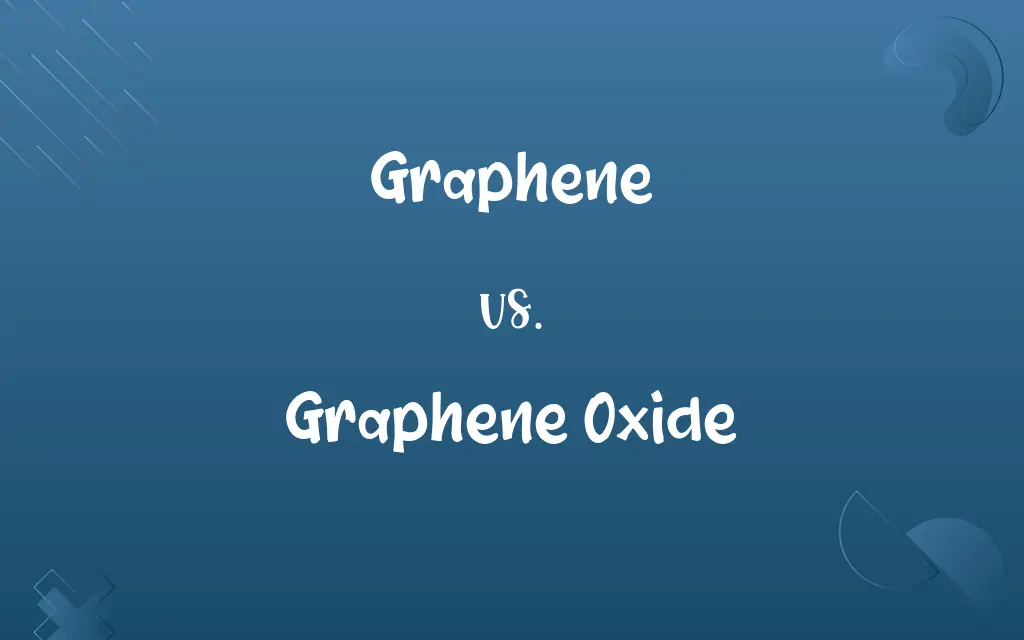Graphene vs. Graphene Oxide: Know the Difference

By Shumaila Saeed || Updated on December 25, 2023
Graphene is a single layer of carbon atoms arranged in a hexagonal lattice, known for its exceptional conductivity. Graphene Oxide is graphene modified with oxygen-containing groups, resulting in reduced conductivity compared to pure graphene.

Key Differences
Graphene is a single layer of carbon atoms arranged in a hexagonal lattice. Graphene Oxide (GO), on the other hand, is a derivative of graphene, consisting of various oxygen functional groups. While graphene is known for its exceptional electrical conductivity, GO is less conductive due to these oxygen groups.
Shumaila Saeed
Dec 16, 2023
Graphene is renowned for its strength, being one of the strongest known materials. Graphene Oxide, while still strong, has reduced mechanical properties compared to graphene due to the disruption of the carbon lattice by oxygen groups. Both materials, however, are highly versatile and used in various applications.
Shumaila Saeed
Dec 16, 2023
Graphene's thermal and electrical conductivity are superior, making it ideal for electronic applications. Graphene Oxide, with its functional groups, is more amenable to certain chemical processes and modifications. Both are used in composite materials, but for different purposes due to these properties.
Shumaila Saeed
Dec 16, 2023
Graphene is almost entirely carbon, with a flat, two-dimensional structure. Graphene Oxide includes additional oxygen atoms, which introduce a level of disorder and spacing in the structure. Both graphene and GO are used in nanotechnology, but their different structures lend them to different uses.
Shumaila Saeed
Dec 16, 2023
Graphene is hydrophobic, meaning it repels water. Graphene Oxide, in contrast, is hydrophilic due to its oxygen content, making it more easily dispersible in water and other solvents. This property difference between graphene and GO influences their respective uses in various fields.
Shumaila Saeed
Dec 16, 2023
ADVERTISEMENT
Comparison Chart
Chemical Properties
Hydrophobic, less reactive
Hydrophilic, more chemically active
Shumaila Saeed
Dec 16, 2023
ADVERTISEMENT
Graphene and Graphene Oxide Definitions
Graphene
Graphene is almost transparent and extremely flexible.
Graphene's flexibility enables its use in flexible displays.
Shumaila Saeed
Dec 10, 2023
Graphene Oxide
More chemically active than graphene.
Graphene Oxide can be further modified chemically.
Shumaila Saeed
Dec 10, 2023
Graphene
A monolayer of carbon atoms in a hexagonal lattice.
Graphene is used in high-strength composites.
Shumaila Saeed
Dec 10, 2023
Graphene Oxide
Hydrophilic, making it dispersible in water.
Graphene Oxide's hydrophilicity aids in biosensing applications.
Shumaila Saeed
Dec 10, 2023
Graphene
The basic structural element of other carbon allotropes.
Graphene sheets stack to form graphite.
Shumaila Saeed
Dec 10, 2023
ADVERTISEMENT
Graphene Oxide
Graphene functionalized with oxygen-containing groups.
Graphene Oxide is used for making graphene-based membranes.
Shumaila Saeed
Dec 10, 2023
Graphene
Known for its exceptional strength and conductivity.
Graphene's conductivity makes it ideal for electronic devices.
Shumaila Saeed
Dec 10, 2023
Graphene Oxide
Has a disrupted carbon lattice due to oxygen groups.
Graphene Oxide's structure makes it less conductive.
Shumaila Saeed
Dec 10, 2023
Graphene
A 2D material with potential for revolutionary applications.
Graphene has potential in next-generation nanotechnology.
Shumaila Saeed
Dec 10, 2023
Graphene Oxide
Used in applications where its functional groups are advantageous.
Graphene Oxide is used in targeted drug delivery systems.
Shumaila Saeed
Dec 10, 2023
Graphene
A monolayer of carbon atoms having a hexagonal lattice structure and constituting a basic structural element of graphite, fullerenes, and carbon nanotubes.
Shumaila Saeed
Dec 10, 2023
Graphene
(organic chemistry) Any polycyclic aromatic hydrocarbon having the structure of part of a layer of graphite.
Shumaila Saeed
Dec 10, 2023
Graphene
(inorganic chemistry) An arbitrarily large-scale, one-atom-thick layer of graphite, an allotrope of carbon, that has remarkable electric characteristics.
Shumaila Saeed
Dec 10, 2023
Repeatedly Asked Queries
What is Graphene Oxide?
Graphene functionalized with oxygen-containing groups.
Shumaila Saeed
Dec 16, 2023
Are Graphene and Graphene Oxide used in the same applications?
They have different applications due to their distinct properties.
Shumaila Saeed
Dec 16, 2023
How does Graphene differ from Graphene Oxide in conductivity?
Graphene has higher electrical conductivity than Graphene Oxide.
Shumaila Saeed
Dec 16, 2023
What is Graphene?
A single layer of carbon atoms arranged in a hexagonal lattice.
Shumaila Saeed
Dec 16, 2023
Is Graphene stronger than Graphene Oxide?
Yes, graphene is stronger than Graphene Oxide.
Shumaila Saeed
Dec 16, 2023
Is Graphene a natural or synthetic material?
Graphene can be found naturally in small quantities, but it is often synthesized in the laboratory.
Shumaila Saeed
Dec 16, 2023
Can Graphene be used in batteries?
Yes, Graphene-based materials are being explored for improving the performance of batteries.
Shumaila Saeed
Dec 16, 2023
Is Graphene biodegradable?
Graphene is not biodegradable because it is composed of carbon atoms.
Shumaila Saeed
Dec 16, 2023
Can Graphene Oxide be reduced back to Graphene?
Yes, through chemical reduction processes.
Shumaila Saeed
Dec 16, 2023
Is Graphene a good thermal conductor?
Yes, Graphene is an excellent thermal conductor, making it valuable in heat management applications.
Shumaila Saeed
Dec 16, 2023
Is Graphene a superconductor?
Pure Graphene is not a superconductor, but it has unique electronic properties that can be manipulated for various applications.
Shumaila Saeed
Dec 16, 2023
Is Graphene Oxide water-soluble?
Yes, Graphene Oxide is water-soluble, making it useful for various aqueous applications.
Shumaila Saeed
Dec 16, 2023
What are the potential applications of Graphene Oxide?
Graphene Oxide has applications in water purification, drug delivery, and biomedical research.
Shumaila Saeed
Dec 16, 2023
What are the potential applications of Graphene?
Graphene has applications in electronics, materials science, energy storage, and even medical devices.
Shumaila Saeed
Dec 16, 2023
Is Graphene transparent?
Graphene is nearly transparent, allowing it to be used in transparent conductive coatings and displays.
Shumaila Saeed
Dec 16, 2023
What is the melting point of Graphene?
Graphene does not have a well-defined melting point due to its two-dimensional structure.
Shumaila Saeed
Dec 16, 2023
What are the differences between Graphene and Graphene Oxide?
Graphene Oxide is less conductive and has more oxygen groups on its surface compared to pure Graphene.
Shumaila Saeed
Dec 16, 2023
Is Graphene Oxide more affordable than Graphene?
Graphene Oxide is often more affordable to produce than pure Graphene due to its simpler synthesis methods.
Shumaila Saeed
Dec 16, 2023
Can Graphene Oxide be used for electronics?
Graphene Oxide is less suitable for electronics than pure Graphene due to its reduced conductivity.
Shumaila Saeed
Dec 16, 2023
Is Graphene Oxide biocompatible?
Graphene Oxide can be engineered for biocompatibility, but its interactions with living organisms require careful consideration.
Shumaila Saeed
Dec 16, 2023
Share this page
Link for your blog / website
HTML
Link to share via messenger
About Author
Written by
Shumaila SaeedShumaila Saeed, an expert content creator with 6 years of experience, specializes in distilling complex topics into easily digestible comparisons, shining a light on the nuances that both inform and educate readers with clarity and accuracy.









































































